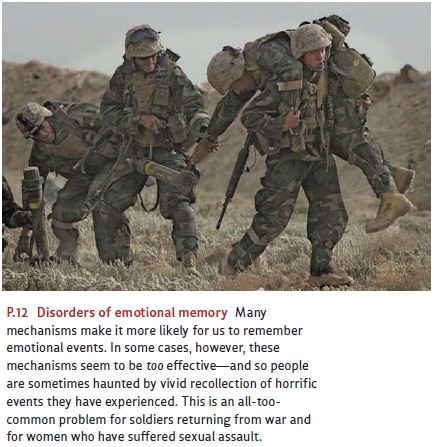Chapter: Psychology: Prologue: What Is Psychology?
Disorders of Emotional Memory
Disorders of
Emotional Memory
Each perspective on emotional
memory contributes to our overall understanding, and each approach can be
informed by the others. But there is still one more perspective we need to
consider: Throughout psychology, we must understand the ways that people are
alike, and also the ways they differ. Some of the differences among people can
be understood as vari-ations within the range considered healthy or “normal”;
these include differences in per-sonality, aptitudes, beliefs, and more. But
some differences among people—including their responses to emotional
events—take us outside of the range that we can call “healthy.”
Consider, for example, people who
have witnessed a violent car crash. As we have discussed, various mechanisms
promote memory for this sort of emotional episode. But, for some people, these
mechanisms seem too effective. They
seem to end up with “too much memory” of the crash, and they cannot get the
disturbing scene out of their heads.
Similar descriptions apply to a
soldier who has been through a horrible battle, or a woman who has been raped.
In these cases, it is important that there be some memory. The soldier often
needs to report to his officer what happened, so that the next step in the
battle can be planned (Figure P.12). The woman needs to remember her ordeal so
that she can give evidence to the police that will lead to the prosecu-tion of
the rapist. Even so, the soldier and the rape victim eventually need to move on
with their lives, and put the horrors of their experiences behind them. But
this may not be possible, because the painful memory may stay with them more
than they would wish.

In such cases, the neural and
cognitive mechanisms that support emotional remembering seem to produce a cruel
enhancement of memory. This horrific mem-ory can, in turn, contribute to the
condition known as post-traumatic stress
disorder, or PTSD. Be aware,
though, that not all soldiers, and not all rape victims, develop PTSD—and we
need to ask why this is. Part of the explanation lies in biology: Some people
seem genetically at greater risk for this disorder, plausibly because their
nerv-ous systems are especially reactive to whatever stressful events they
encounter. Cognitive mechanisms are also relevant, because the emergence of
PTSD depends to some extent on a person’s beliefs and expectations—in
particular, what the person feared would
happen at a moment of crisis, rather than what actually happened.Social
mechanisms are also pertinent; studies indicate that telling others about the
trauma, or even just writing about the trauma in a diary, can help defuse the
emo-tional response to the trauma and thus make PTSD less likely (e.g.,
Pennebaker, 2004).
Related Topics